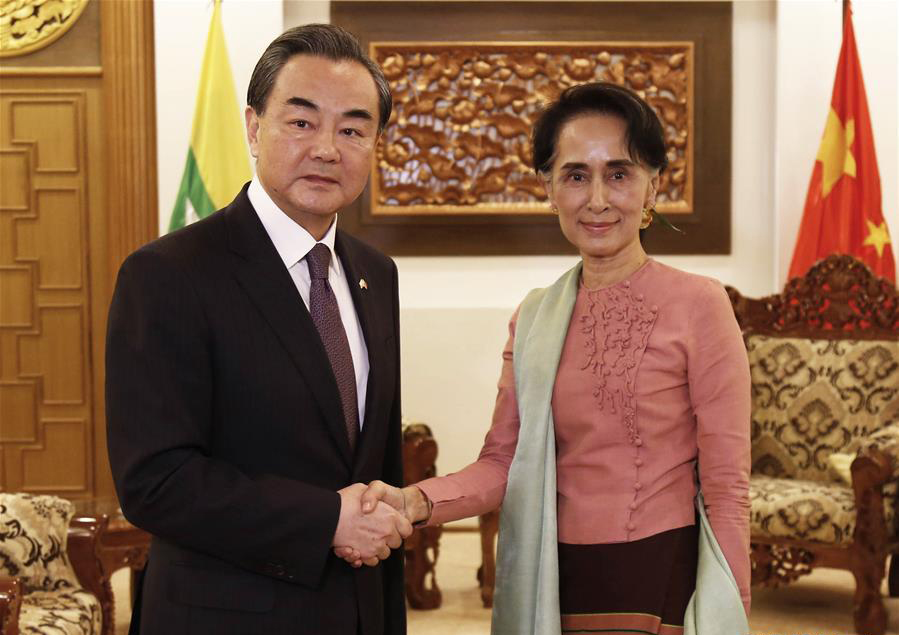Enhanced ties boost research on Myanmar

Chinese Foreign Minister Wang Yi visited Myanmar at the invitation of his counterpart Aung San Suu Kyi from April 5 to 6. His visit marks a new chapter of China-Myanmar relations and brings with it opportunities for research on Myanmar.
Chinese Foreign Minister Wang Yi visited Myanmar at the invitation of his counterpart Aung San Suu Kyi from April 5 to 6. He is the first foreign minister to visit the country since the new government took power. The visit marks a new chapter of China-Myanmar relations, and brings with it opportunities for academic research.
Huge potential
The friendship and growing bilateral ties between China and Myanmar provide favorable conditions for research on Myanmar in China.
He Shengda, a research fellow from the Yunnan Academy of Social Sciences, said ancient books tell of how China dispatched envoys to Myanmar along with copies of Chinese laws. This information is of great value for academia despite not being classified as scientific research.
Chinese research on Myanmar, as it relates to the modern definition, started in the late 19th century. During the 1950s to 1970s, it mainly focused on background information, translation of foreign sources on Myanmar, and studies on economics and nationality. The 21st century witnessed fruitful achievements in this field.
In recent years, research on Myanmar has drawn more academic attention as it is crucial for China-Myanmar relations. “Chinese society is also interested in it. Chinese investors do not aim solely for investment. They are also making attempts to understand more about the country. The prospects for their companies in Myanmar are alluring,” said Li Chenyang, director of the Institute of Research on Myanmar.
However, the research lacks professionals and is dispersed across various branches. “Its elementary studies are weak, and its perspective and methods are constrained in terms of in-depth research. But the situation will improve as the two countries further promote exchanges,” said Wang Zichang, a professor of international studies at Jinan University in Guangdong Province.
Further cooperation
The public in Myanmar expect the new government to develop the economy and restore prosperity. China and Myanmar are friendly neighbors, sharing a border of more than 2,200 kilometers. Also, they have common wishes and interests in various aspects, such as the China-ASEAN Free Trade Zone and Belt and Road Initiative.
China is the biggest trade partner, biggest investor and major donor country of Myanmar. “Through reform of the economic and foreign trade structure, Myanmar expects to import processed goods rather than raw agricultural products from China. Therefore, we should turn to agro-technology and industrial products to assist Myanmar,” Wang said.
Wang’s visit represents an active attempt at diplomacy with China’s neighbors countries. The two countries should further advance cooperation in infrastructure and connectivity, driving the development of the China-Myanmar cross-Border Trade Zone, said Xu Liping, an associate researcher on international strategy at the Chinese Academy of Social Sciences.
Prospects
Academics have stated that Wang’s visit is a testament to the close interaction between the two sides. Future research on Myanmar will mainly focus on the new political environment, challenges in economic and social development as well as changes in foreign relations, He said.
Meanwhile, exchanges between China and Myanmar have been increasingly strengthened when it comes to think tanks. “Emphasis should be placed on elementary and countermeasure research, thus serving society, enterprises and the country,” said Li.
Xu repeated this, saying “Myanmar is a hot topic in international studies in China. There will be challenges and opportunities at the same time. The research should probe deeper by building a regular mechanism for think thank exchanges.”
Chinese academia should integrate research power, and enhance exchanges and cooperation with academic organs in Myanmar, in order to create more opportunities to conduct research in Myanmar. However, particular attention should be paid to methods, thus making the people in Myanmar understand our sincerity, He added.
Zhang Junrong and Pan Yuefei are reporters at the Chinese Social Sciences Today.
